On a recent morning in Las Vegas, Charolette Richards, owner of A Little White Wedding Chapel, sat at her desk, exhausted, after having just officiated the longest wedding ceremony of her life.
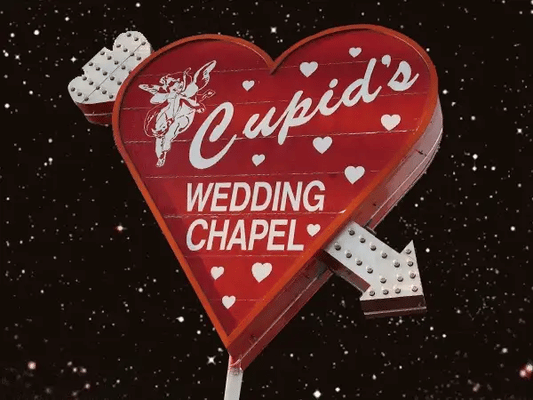
“It took me an hour to do that wedding,” she told The Hustle. “I’ve never done it in an hour. 10,15 minutes — that’s what they usually run.”
At age 86, Richards has, by her own count, officiated tens of thousands of weddings in the nearly 7 decades she’s served as a minister at the downtown Las Vegas Boulevard chapel.
Richards is one of dozens of chapel operators who line Las Vegas Blvd., cashing in on the area’s shotgun wedding industry.
Today, weddings are an integral part of the Las Vegas economy: Wedding-related tourism accounts for nearly $2B of the city’s annual $58B tourism industry and generates ~18k jobs.
The casual, kitschy 10-minute ceremonies offered by A Little White Wedding Chapel — nicknamed “quickie” weddings for their efficiency — are the bread and butter of the Las Vegas wedding industry.
How did Las Vegas become the quickie wedding capital of the world? Are shotgun weddings still a moneymaker today? And is there a future for 15-minute weddings in the growing wedding economy?
A brief history of Vegas weddings
Easy, no-frills marriages have been a part of Nevada’s history since the early 1900s.
Unlike other states, Nevada waived blood tests and required waiting periods meant to deter couples from getting married while inebriated, making it an especially popular wedding destination for Californian couples looking to get hitched as quickly as possible.
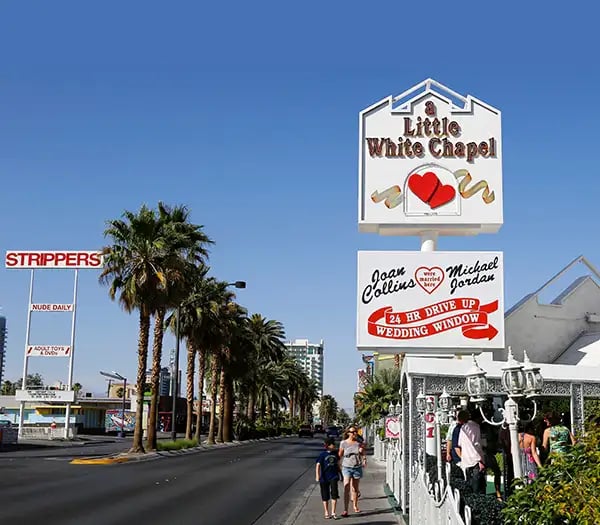
A Little White Wedding Chapel in Las Vegas (Andia/Universal Images Group via Getty Images)
But it wasn’t until 1931 when weddings became a growing staple of Las Vegas’s budding tourism industry.
That year, state officials passed bills legalizing gambling and shortening the time in which couples could get a divorce, establishing the state as what a 1931 report in the Nevada State Journal called “foremost in the business of serving unsuccessful marriages.”
By the mid-1930s, Las Vegas was quickly becoming known as not only a gambling town but as a city that provided the easiest route to enter (or exit) matrimony in the US.
State officials had a clear incentive for making Nevada’s marriage and divorce requirements as lenient as possible.
“Frankly, it was about luring tourists and trying to make Las Vegas an attractive destination by giving people any reason at all to visit,” said David Schwartz, who teaches courses on Nevadan history at the University of Nevada Las Vegas.
Happy newlyweds and unhappy divorcees flocking to Las Vegas had one thing in common: both were spending money at the city’s brand new casinos and hotels.
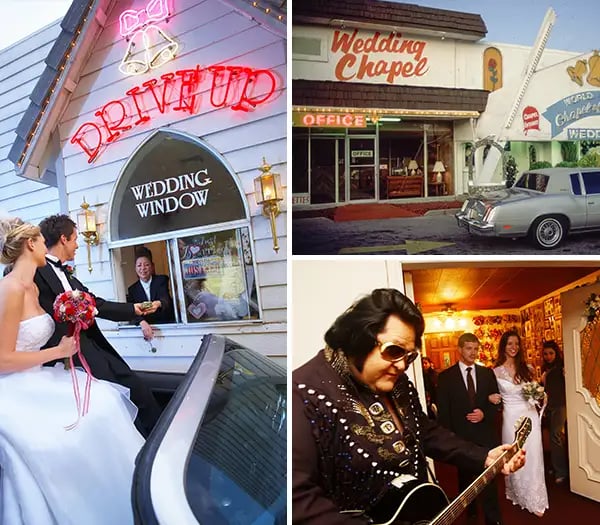
Drive-up windows, Elvis impersonators, and 24-hour service: Scenes from the Las Vegas wedding industry (Getty Images)
To capitalize on the wave of wedding tourism, the city opened a marriage license bureau in the train depot and kept its doors open until midnight.
On weekends and holidays, the office was open 24 hours a day, a practice which continued until 2006. By 1941, Las Vegas had issued 21k marriage licenses, up from the 5.3k issued just 2 years earlier.
Steps away from the marriage license bureau, wedding chapels began opening their doors to officiate the marriages of hundreds of couples with freshly issued marriage licenses in hand.
As early as 1933, an enterprising minister was documented turning his home into a 24-hour chapel to marry couples day and night.
The city’s wedding scene was soon attracting celebrity attention.
In 1954, leading box office star Kirk Douglass married Hollywood publicist Anne Buydens at the Sahara Hotel. Four years later, actors Paul Newman and Joanne Woodward were wed at the now-defunct El Rancho.
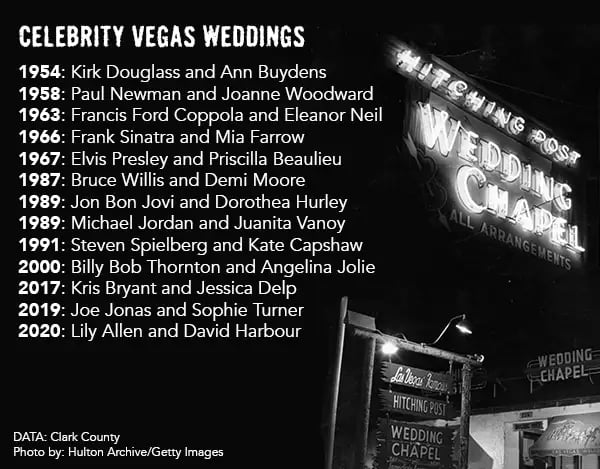
The Hustle
Slowly but surely, Las Vegas began to redefine the cultural characterization of weddings.
“[Las Vegas] took weddings, which can be harrowing, solemn, serious affairs, and made them into something fun and irreverent,” said Schwartz.
A $2B business
Richards, the octogenarian proprietor of the Little White Wedding Chapel, was among the earliest chapel owners to capitalize on this irreverence in the 1950s, by building out a drive-thru for any couples hoping to perform their nuptials with curbside expediency.
Richard’s business officiates between 600 to 800 marriages a month on average, at a starting price of $75. On holidays and days with memorable dates, the chapel can bring in more business.
On 07-07-07, for instance, Richards married 557 couples in just 24 hours.
Like other downtown chapels, Richard’s business faces stiff competition from not only the dozens of other downtown chapels but also the many hotels and golf courses that have begun providing their own on-premise wedding services.
A more recent entrant to the Las Vegas wedding scene is the Mobile Minister, a one-man wedding service run by minister and Elvis impersonator Roland August who marries couples at scenic city locations like Red Rock and the Bellagio fountains.
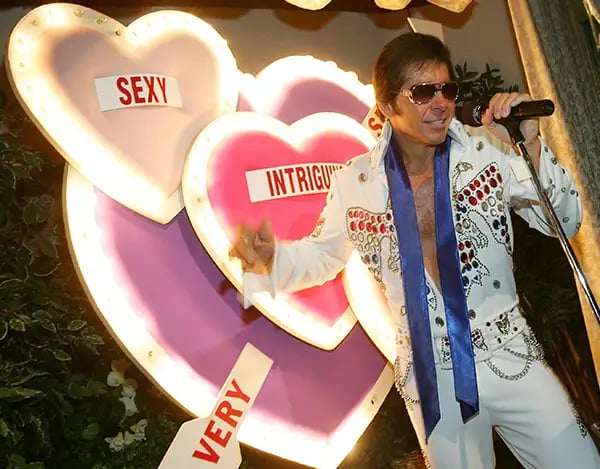
Roland August performs during a commitment ceremony in 2007 (Ethan Miller/Getty Images)
Roland, who has worked in the Las Vegas wedding industry for the past 15 years, has seen a dramatic shift in the way that chapels operate with the advent of internet advertising and review sites.
While the in-and-out assembly line of the quickie wedding experience hasn’t fared well on review sites, many chapels must continue to operate at a high volume if they hope to turn a profit.
“The overhead is astronomical,” said August. “Not only are they renting the chapel and have a limo team with 5 or 6 limos they lease out but they spend so much money driving their business on the internet as well.”
One downtown chapel where Roland previously worked spent around $20k/month on Google Adwords which drove around 80% of their bookings.
“With all of these things going on, you’ve got to do over 200 weddings a month just to survive,” he said.
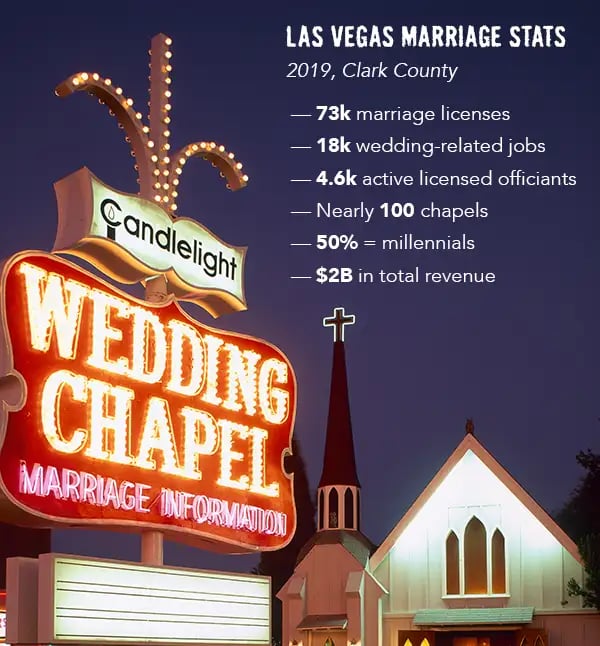
Image: Getty / Data: Clark County
Some chapels like the Little Church of the West, founded in 1941, have shifted their focus from quantity to quality.
The chapel now only marries one couple at a time and has designed its parking lot and entrances so that a bride who comes in will never see another bride.
“The idea is that if you do right by people and give them a great experience it will reflect in the online reviews,” said Daniel Vallance, the chapel’s director of operations.
What the future holds for Sin City weddings
Today, new generations are redefining the Vegas wedding experience with weddings among millennials recently becoming a growing economic driver, said Clark County Clerk Lynn Goya.
“[Millennials will] rent a cabana, take a tour, go to nightclubs and buy an $800 bottle of vodka when normally they wouldn’t do that.”
Las Vegas may still need to adapt in order to accommodate new generations and their expectations when it comes to the wedding industry.
There’s been a sharp decrease in demand for Las Vegas weddings, as well: In 2004, Clark County issued 128k marriage licenses; since then, the number of marriage licenses has steadily decreased to around 70k on average per year.
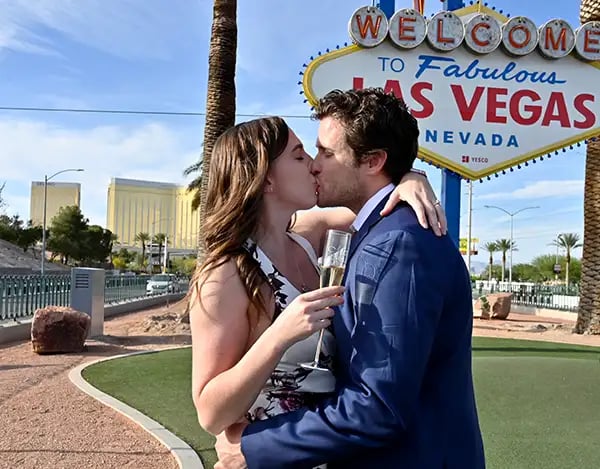
A young couple celebrates their wedding in Vegas at the height of the pandemic in 2020 (DAVID BECKER/AFP via Getty Images)
For some, the Vegas “quickie” wedding may soon be a relic of the past.
“A lot of the old chapels have a model that’s based on very large volume,” Vallance said. “And that volume is decreasing.”
Still, the reality remains that there will always be a business for quick, cheap, straightforward weddings.
“10 to 15 minutes of staring into someone’s eyes feels like a lot longer than you might think,” Vallance continued. “I’ve been married twice, so I know.”